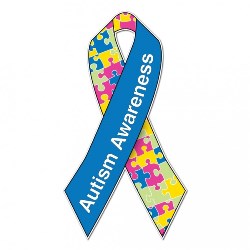Our featured trial in March 2017 is NCT03099239: “hCT-MSCs for Children With Autism Spectrum Disorder (ASD)”. This trial was submitted to ClinicalTrials.gov on 24 March 2017 and the anticipated start date is 2 May 2017. It will be conducted at Duke University Medical Center under Principal Investigators Joanne Kurtzberg, MD, Geraldine Dawson, PhD, and Jessica Sun, MD. The outside sponsor is the Marcus Foundation.
 April is “Autism Awareness Month”. Duke University has established a research program dedicated to stem cell therapy for autism, profiled by us in July 2014. During April 2017, Duke’s previous trial of stem cell therapy for autism NCT02176317 was published in Stem Cells Translational Medicine and profiled by CNN. The previous Duke trial was a Phase 1 study of 25 children who received an autologous infusion of cord blood stem cells. The latest trial that was registered in March 2017 will be a Phase 1 study of 12 children who will receive allogeneic MSCs (mesenchymal stem/stromal cells) from umbilical cord tissue.
April is “Autism Awareness Month”. Duke University has established a research program dedicated to stem cell therapy for autism, profiled by us in July 2014. During April 2017, Duke’s previous trial of stem cell therapy for autism NCT02176317 was published in Stem Cells Translational Medicine and profiled by CNN. The previous Duke trial was a Phase 1 study of 25 children who received an autologous infusion of cord blood stem cells. The latest trial that was registered in March 2017 will be a Phase 1 study of 12 children who will receive allogeneic MSCs (mesenchymal stem/stromal cells) from umbilical cord tissue.
The decision to treat autism with cells sourced from cord tissue instead of cord blood is a surprising move. Over the past decade, Duke has established a pipeline of regenerative medicine trials for cerebral palsy that have progressed from autologous cord blood to sibling cord blood to allogeneic cord blood, but always their therapy sourced cells from cord blood. Possibly inspired by the growing movement to trial MSCs for acquired neurological disorders, Duke has decided to become the first academic center in the west to register a trial of MSC therapy for autism.
The first registered trial NCT01343511 of cell therapy for autism was conducted in China in 2011 and published in 2013. This phase 1/2 trial compared 37 patients on three arms: a combination therapy of cord blood MNCs (mononuclear cells) and cord tissue MSCs, versus cord blood MNCs alone, and a control group of rehabilitation alone. Relying on standard measures of behavior in autism spectrum disorder, this study found a significant improvement in the groups that received cell therapy, with the greatest improvement in the combination therapy.
Subsequently, two trials of autologous cord blood therapy for autism were registered in the United States, a Phase 2 trial NCT01638819 in 2012 at Sutter Health and a Phase 1 trial NCT02176317 in 2014 at Duke University. Both trials have presented conference posters reporting significant behavioral improvements in the months after therapy, and as stated earlier the Duke trial was published this month.
The first registered trial to treat autism with umbilical cord mesenchymal stem/stromal cells was NCT02192749, listed in 2014 by a clinic in Panama that has a track record of registering trials but not publishing papers. Meanwhile, a group in Poland affiliated with Polski Bank Komórek Macierzystych S.A. (PBKM), also started treating autistic children with MSCs from cord tissue in 2014 and will present their work at the International Cord Blood Symposium in June 2017. However, the study in Poland is not listed on a trials registry.
The new autism trial NCT03099239 at Duke intends to use MSCs that have been previously isolated from cord tissue by enzymatic digestion, expanded in culture, and cryopreserved. This approach insures uniformity of cells across doses. The trial will enroll 12 children into three groups that receive one, two, and three infusions. By establishing a uniform frozen cell therapy product, it looks like Duke is preparing to apply for FDA approval of this therapy if it is successful.
If initial reports on MSC therapy for autism are positive, it will trigger competition to offer patients the most effective therapy with the most convenient access and the most economical price. That could lead to multiple health care centers trying to serve community that currently numbers 1 in 68 children in the United States.